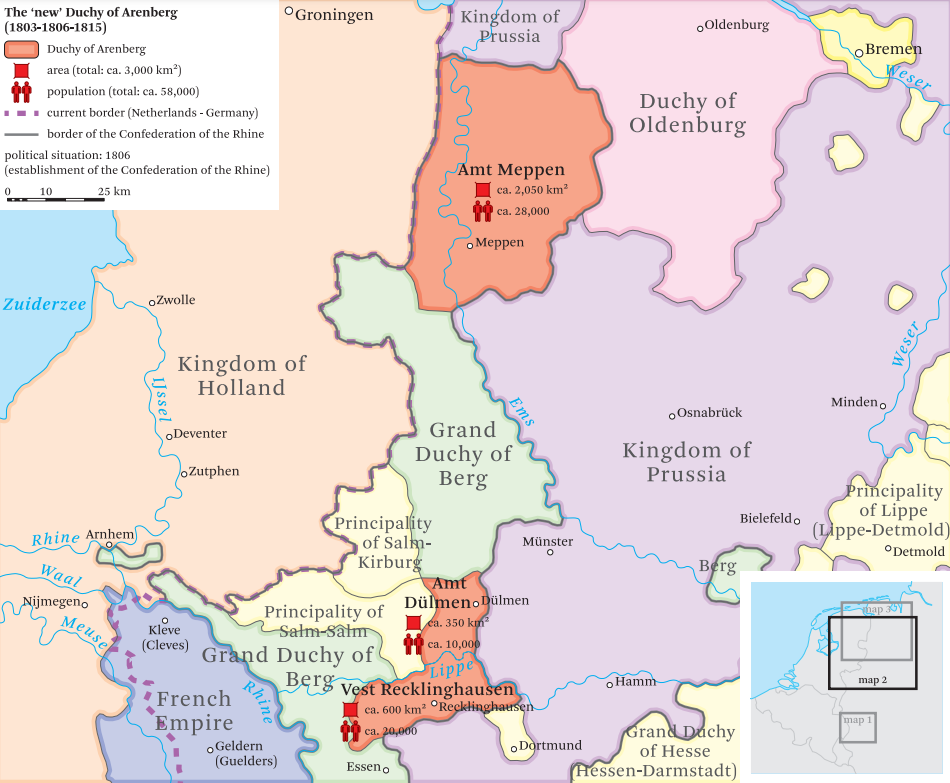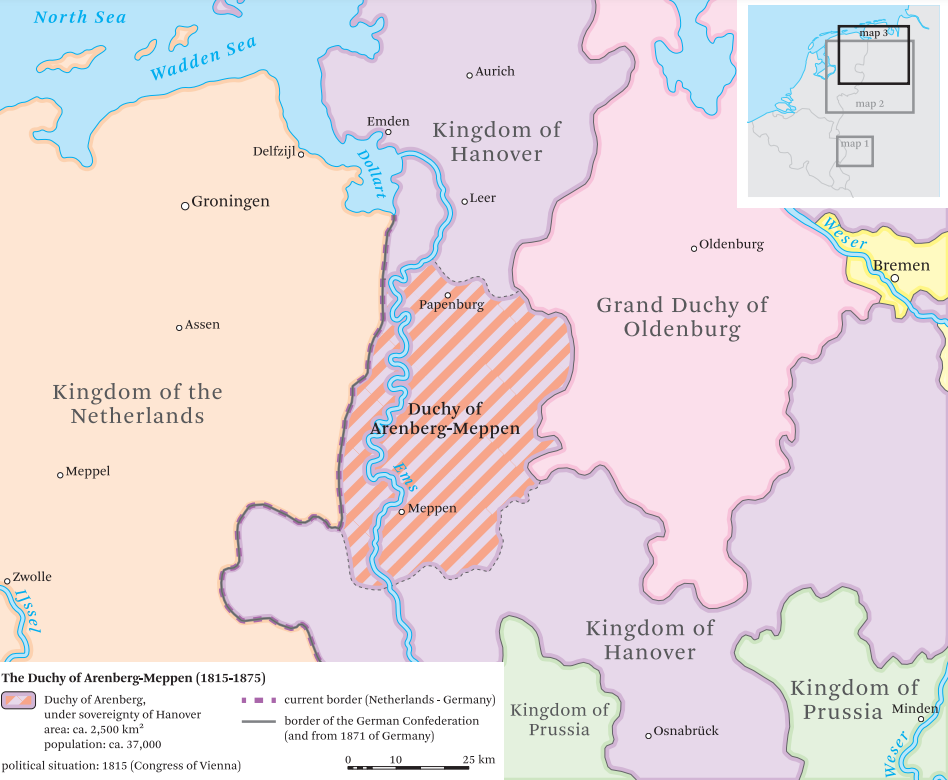
The New Duchy of Arenberg


The new duchy of Arenberg was born on the right bank of the Rhine after a decision taken during the Imperial Diet, the final stage of the protocol instituted by the commission established by the Diet of Regensburg in 1801. The 1,800 sovereign states within the German territories were radically reduced in number to some sixty or so, and the sovereigns who had lost their lands on the left bank of the Rhine received compensations on the right bank at the expense of the Church, whose goods were secularised.
The new duchy consisted of the county of Recklinghausen, the principality of Meppen and, from 1806, of the seigneury of Dülmen. The capital was Recklinghausen, and the duke made the count of Westerholt his head of government. The new duchy of Arenberg was part of the Confederation of the Rhine, and in a note dated in 1808, the prince-primate declared that according to article 11 of the Act of Confederation, there was no doubt that the House of Arenberg occupied the foremost rank in the protocol of the college of princes.
The duke Louis-Engelbert renounced his rights and the new sovereign duke, Prosper-Louis (1785-1861), took part in Napoleon's military campaigns, an alliance in which both parties clearly aimed at political goals. The duke of Arenberg needed the support of the emperor of the French to face off Prussia, which wanted to incorporate Meppen in order to consolidate its own territories of Münster and eastern Friesland. Napoleon found a way of showing the old nobility of the Low Countries the advantages in supporting his military policies.
As sovereign prince and member of the Confederation of the Rhine, Prosper-Louis had to raise a contingent of 379 soldiers according to the treaty. In addition he had undertaken to raise a regiment of light cavalry from around Liège, the Belgian light cavalry which in 1808 became the 27th mounted dragoons. At the head of this regiment, consisting originally of some 360 men but later with a complement of up to 1,014, the duke marched on Pomerania, Schleswig, Denmark and finally Spain, where he was seriously wounded in the battle of Arroyo-Molinos and captured by the English on 28 October 1811. He remained their prisoner until 1814.
During this period, the ultimate catastrophe for Prosper-Louis was the loss of his duchy. By decrees issued in December 1810 and January 1811, Napoleon annexed to France the whole of the Baltic coast from the Ems to the Elbe together with the interior territories without prior announcements to either the towns or the ruling princes concerned. With the exception of Recklinghausen, all the Arenberg lands were affected by this measure. In exchange, the duke of Arenberg became a count of Napoleon's empire and received a pension from the French state. But in January 1811, Recklinghausen was incorporated into the French Grand Duchy of Berg, without a word of warning to the duke's ambassador, baron Schmaus van Livonegg. In addition to his territorial expansion, Napoleon wanted to reinforce the blockade known as the Continental System. This economic and trade embargo against England, which caused so much damage to trade throughout Europe, was in fact broken from the ducal port of Papenburg by hundreds of boats flying the Arenberg flag.
When duke Prosper-Louis returned in May 1814 from captivity in England, the situation had changed once again. At the "battle of the nations" at Leipzig in 1813, the 'Grande Armée', weakened by the Russian campaign, was beaten. Thereupon the Prussian troops had occupied the former Arenberg territories of Meppen, Dülmen and Recklinghausen. When king Louis XVIII gave his instructions to Talleyrand, his ambassador at the Congress of Vienna, he rightly pointed out that the allies did not clearly recognise the rights of the duke of Arenberg nor those of the princes of Salm and Isenburg, and that these princes were being deprived of their sovereignty without their consent.
The treaty of 29 May 1815 between Prussia and the kingdom of Hanover gave the territory of Meppen to Hanover and the remainder, that is Recklinghausen and Dülmen, to Prussia.
In this manner the duke of Arenberg lost a duchy the size of the actual Grand Duchy of Luxembourg.
Size and population of the new duchy of Arenberg
(according to figures given by the Congres of Vienna 1815)
- Vest Recklinghausen: 618.75 km² or 11 square miles for 18,000 inhabitants
(1 German square mile = 56.25 km²) - Duchy Arenberg-Meppen: 2,250 km² or 40 square miles for 31,000 inhabitants
- Lordship of Dülmen: 309.37 km² or 5.5 square miles for 10,000 inhabitants
In total: 59,000 inhabitants, 3,178 km² or 56.5 square miles
Comparison :
- Size of the Grand-Duchy of Luxemburg today: 2.586 km²
-
Population (2007) :
- Recklinghausen: 125.000 inhabitants
- Kreis Emsland (Meppen): 315.000 inhabitants
- Dülmen: 47.500 inhabitants




